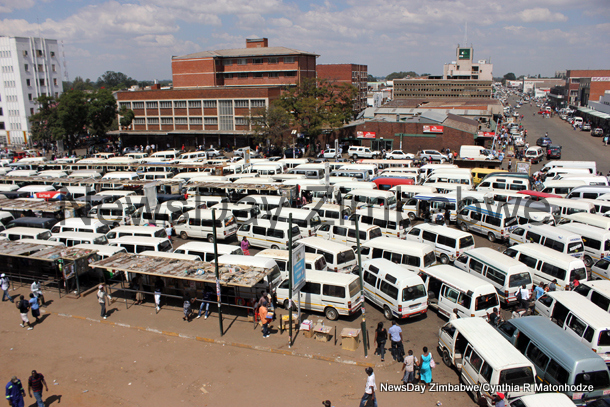
IT was midday and the sun was blazing as pedestrians in downtown Harare went about their frenetic daily chores. The sidewalks were crammed with merchandise ranging from food items to accessories, laid on the ground by illegal vendors.
BY KENNEDY NYAVAYA
For Marvelous Chonzi, such crowds are currency and the baking heat is the least of his worries. Clad in a stone-washed Spanish football team Real Madrid replica jersey, imprinted “Pablo 16” at the back and a matching pair of track bottoms and trendy sneakers, he can be heard at the corner of Mbuya Nehanda and Jason Moyo streets shouting repeatedly: “Mabelreign! Sherwood! Westgate!”
Chonzi was pointing at a revving mini bus, ready for a jet-like take-off in case dreaded law enforcers pounce.
His job entails ushering commuters into the kombis, but the recent lockdown following the COVID-19 outbreak has literally thrown him out of work.
“I have been working on the streets for almost a decade now and my family gets a living off it, so if I do not come here they lose their livelihood,” Chonzi, a father of two, told NewsDay.
“This is where I make my money and as I am speaking to you, my family is expectant of my return so I cannot go back home with nothing.”
Chonzi used to make enough money to provide for his family, but with the country now in the second week of a nationwide lockdown, life has become bleak.
- Chamisa under fire over US$120K donation
- Mavhunga puts DeMbare into Chibuku quarterfinals
- Pension funds bet on Cabora Bassa oilfields
- Councils defy govt fire tender directive
Keep Reading
This is the story of the majority of people in the informal sector who are not on regular salary but live off their daily earnings.
Government has pledged a $600 million cushion fund for small businesses, vendors and the elderly in the next fortnight in compensation for the losses incurred during lockdown.
“The Ministry of Public Service, Labour and Social Welfare is working with the Ministry of Women Affairs, Community, Small and Medium Enterprises, local authorities and relevant associations to come up with a database of those affected by the 21-day lockdown,” the Public Service ministry said in a statement.
Using the list, the ministry will supposedly disburse grants during the lockdown period.
“This programme is targeting those whose livelihoods were affected by the lockdown. The assistance they will get is short term,” reads the ministry statement in part.
However, this appears to sideline workers in the transport sector generally and rank marshals in particular, according to the Zimbabwe Union of Drivers and Conductors (Zudac) president Fradrick Maguramhinga.
“The transport sector is giving many youth employment, people should not look down on those they call maHwindi because that is where their sustenance is and nowhere else because there is not much alternative employment,” he said.
“Everyone who works in the sector needs assistance at the moment, so we appeal to government and big corporates to help our members.”
Zudac consists of some 500 000 drivers, conductors and rank marshals usually with no basic salaries, yet their means of livelihood was cut abruptly last week leaving them in dire straits.
For Chonzi, the story of how he ended up pursuing such pirate means of survival is long and mind-numbing. He would not have imagined ending up here when he left rural Murewa soon after finishing secondary school in 2010.
A rising star in his village then, he hoped to maximise on his talent by establishing a football career in the city before a bouncing spike tragically landed on his calf muscle in a cop chase, blowing his chances in 2016.
That was the end of a sporting career that never was and soon after he tried buying and selling but that too did not work out.
“I have tried withdrawing from this a number of times and in 2016 I was a vendor selling shoes along Speke Avenue,” he reflected.
“I could have been someone with a bigger business by now but the police in operation to drive informal traders from the streets caught me with 16 pairs of shoes, confiscated them and I went back home with nothing.” Chonzi claimed they often take intoxicating stuff to drown their sorrows.
“We all smoke to refresh here. It is almost impossible to be in this line of work when one does not take intoxicating substances. So among all these people you see, everyone takes a drug of their choice,” he said.
Those who use public transport can attest that most of these young men are foulmouthed and violent and that is a side effect of the substances they take.
“Hunger has pushed many young people to work in the sector and people should not look down upon them because apart from accusations of being undisciplined and foul-mouthed, they are offering a service and feeding their families,” Maguramhinga said.
Zimbabwe has been on an endless economic recession resulting in a rapidly shrinking formal jobs market and deteriorating standards of life over the last two decades.
It is reported that less than 20% of the employable population, mostly youth below 40 years, in the country is in formal employment while industries have been either downsizing or closing down completely.
In cities, a massive population is surviving on hand-to-mouth economics while those in the rural areas are far worse as bumper harvests are no longer guaranteed owing to the adverse effects of recurrent droughts.











